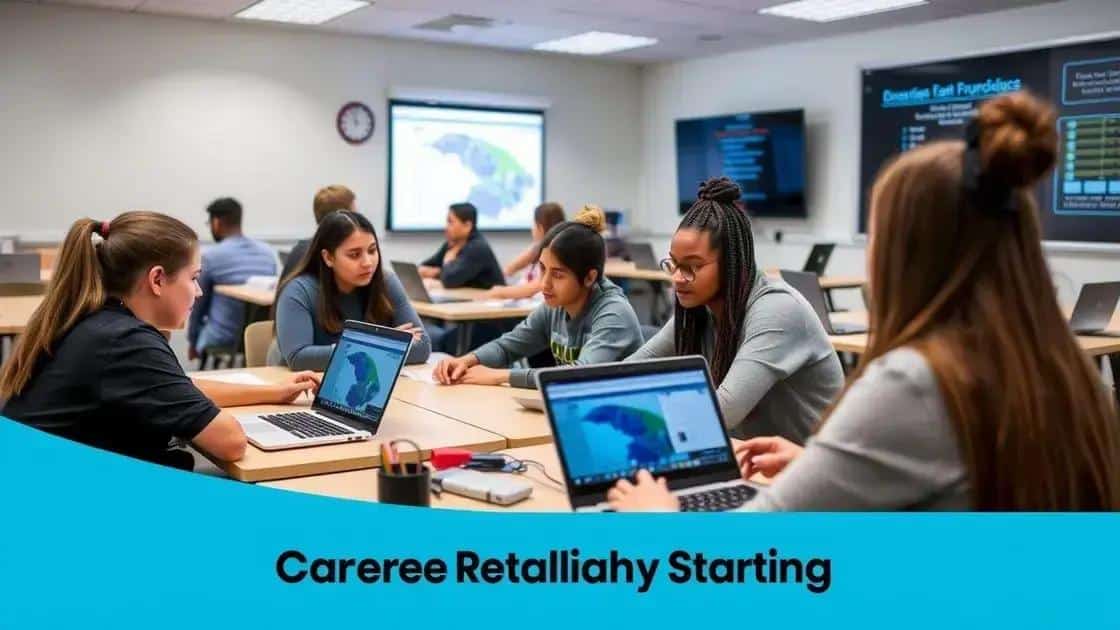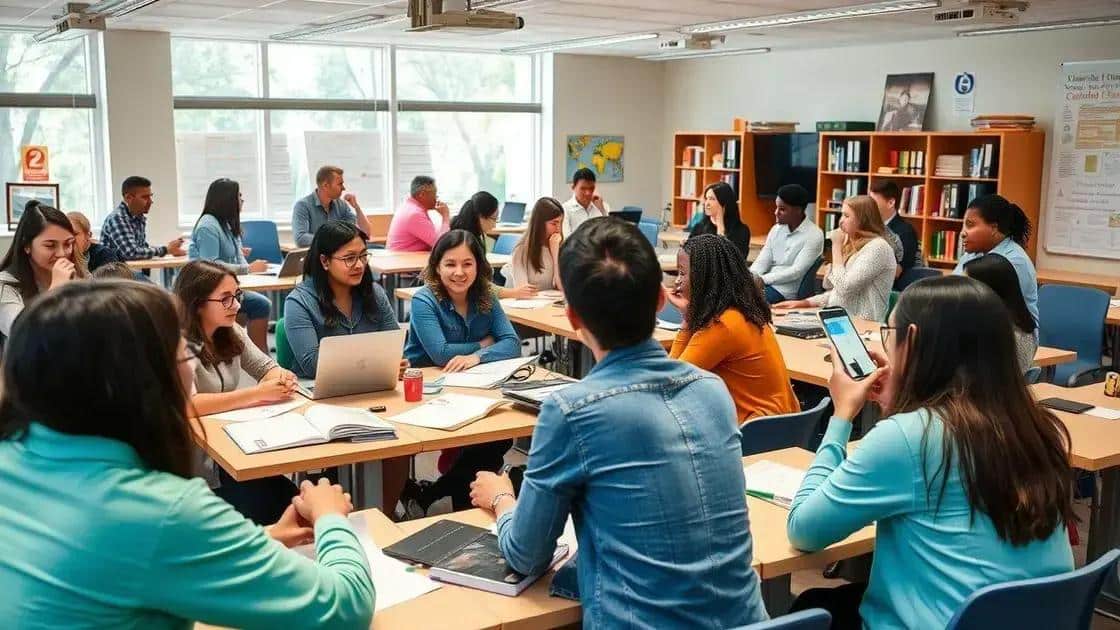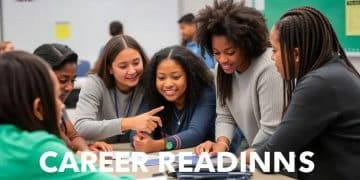Career readiness programs trends shaping the future

Career readiness programs are crucial for equipping students with essential skills through practical training and industry partnerships, ultimately enhancing their employability and success in the job market.
Career readiness programs trends are transforming how organizations prepare individuals for the workplace. As the job market evolves, these programs adapt, reflecting the skills and knowledge demanded by employers today. Are you curious about what this means for your career path?
The importance of career readiness programs
Understanding the importance of career readiness programs is crucial for students and job seekers. These programs help individuals develop the skills needed to excel in the workforce. By focusing on practical skills and real-world experiences, they prepare participants for future success.
Skills Developed Through These Programs
Career readiness programs focus on various skills essential in today’s job market. These include:
- Communication skills: Effective communication is vital in any job. Participants learn how to express their ideas clearly.
- Problem-solving abilities: Employers value those who can think critically and solve problems efficiently.
- Teamwork: Working well with others is important. Programs often include collaborative projects.
Through these components, individuals gain confidence and become more desirable candidates.
How They Benefit Employers
Employers benefit significantly from hiring graduates of career readiness programs. They can expect:
- Prepared candidates: Candidates are ready to tackle tasks from day one.
- Lower training costs: Employers spend less time and money on training.
- Increased retention: Employees who are well-prepared tend to stay longer.
As the job landscape continues to evolve, it’s increasingly clear that career readiness programs provide essential benefits for both job seekers and employers. Participating in such programs can open doors to opportunities that might otherwise remain closed.
Emerging trends in career readiness

Emerging trends in career readiness reflect the ever-changing landscape of the job market. As industries evolve, so do the skills needed for success. Today, more than ever, organizations emphasize the importance of tailor-made programs that prepare candidates for real-world challenges.
Technology Integration
One significant trend is the integration of technology into career readiness programs. Digital tools are becoming essential as they help in:
- Virtual simulations: These allow students to experience real-world scenarios in a controlled environment.
- Online resources: Access to e-learning platforms enhances skill acquisition.
- Feedback tools: Technology provides instant feedback, allowing for continuous improvement.
Adopting these tools not only makes learning engaging but also prepares students for a tech-driven workforce.
Focus on Soft Skills
Another important trend is the growing emphasis on soft skills. Employers are increasingly looking for individuals who possess:
- Emotional intelligence: Understanding and managing one’s emotions and those of others.
- Adaptability: Being flexible and open to change in a fast-paced environment.
- Collaboration: Working effectively within diverse teams.
As these skills become more essential, programs are placing more focus on developing them alongside technical knowledge. This shift ensures that candidates are not only knowledgeable but also capable of thriving in various work settings.
In addition, partnerships with local businesses are on the rise. These collaborations help to bridge the gap between education and employment. By working closely with employers, programs can align their curricula with the exact skills and knowledge that employers seek. This connection makes students more marketable and enhances their job prospects.
How employers view readiness programs
Understanding how employers view readiness programs is key to aligning educational initiatives with industry needs. Many employers recognize these programs as valuable resources that bridge the gap between education and the workplace. They appreciate candidates who have gained practical skills and experience before entering the job market.
Key Benefits for Employers
Employers benefit significantly from hiring graduates of career readiness programs. Some of the main advantages include:
- Preparedness: Graduates are often better prepared for job responsibilities, requiring less training.
- Skill alignment: The skills taught in these programs align closely with what employers seek, making candidates more relevant.
- Reduced turnover: Candidates who have undergone proper training are likely to remain in their roles longer, reducing the costs associated with hiring.
By valuing these programs, employers set the stage for a more skilled workforce.
Partnerships with Educational Institutions
Moreover, many employers actively form partnerships with educational institutions that offer these programs. This collaboration helps in creating tailored curricula that meet current market demands. Employers often contribute insights into the skills and knowledge they wish to see in new hires. These partnerships can lead to:
- Internship opportunities: Providing students real-world experience in their fields.
- Mentorship: Connecting students with professionals who can guide their career paths.
- Feedback loops: Facilitating ongoing discussions about skills gaps and training needs.
Through these collaborative efforts, employers not only enhance the effectiveness of career readiness programs but also promote a pipeline of skilled talent ready to meet their specific needs.
Tips for enhancing program effectiveness

To boost the effectiveness of career readiness programs, several strategies can be applied. These tips aim to enhance both participant engagement and overall outcomes, ensuring that students acquire the skills they need for success.
Engage with Industry Professionals
Incorporating insights from industry professionals is crucial. This can be achieved through:
- Guest lectures: Invite professionals to share real-world experiences.
- Mentorship programs: Pair students with mentors in their desired career fields.
- Workshops: Organize hands-on workshops led by experts to develop specific skills.
These interactions help students understand the job market better and provide practical knowledge that classrooms cannot offer.
Incorporate Real-World Experiences
Students benefit greatly from hands-on experiences. Implementing opportunities such as:
- Internships: Facilitate internships to give students direct exposure to their fields.
- Project-based learning: Assign projects that address real-world problems.
- Job shadowing: Allow students to observe professionals in their work environment.
These experiences foster skills that are highly valued by employers and increase student confidence.
Additionally, continuous assessment and feedback play a significant role in enhancing program effectiveness. Regular evaluations can identify gaps in learning and areas that require adjustment. Engaging students in the assessment process encourages reflection on their own learning, helping them understand areas for growth.
Ongoing communication with stakeholders, such as employers and educational institutions, ensures that the program remains relevant and adaptative. By focusing on these key areas, career readiness programs can significantly improve participant outcomes and align with labor market demands.
In conclusion, career readiness programs are essential for preparing students for successful careers in today’s fast-paced job market. By focusing on practical skills, integrating technology, and fostering partnerships with employers, these programs create pathways to employment. Engaging students with real-world experiences and continuous improvement efforts ensures that they are equipped with the necessary tools to thrive. As the workforce evolves, so too should these programs, adapting to meet the changing demands of employers and society.
FAQ – Frequently Asked Questions about Career Readiness Programs
What are career readiness programs?
Career readiness programs are designed to equip students with the skills and knowledge needed to succeed in the workforce.
How do employers benefit from these programs?
Employers benefit by hiring prepared candidates who require less training and have relevant skills aligned with job market needs.
What skills do these programs focus on?
They focus on both technical skills and essential soft skills like communication, teamwork, and problem-solving.
How can students find internships through these programs?
Many programs include partnerships with local businesses that provide internship opportunities for students to gain real-world experience.





